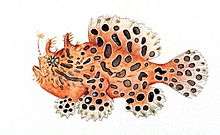Osteoglossomorpha
| Osteoglossomorpha Temporal range: Triassic - Recent | |
|---|---|
.jpg) | |
| Arapaima (Arapaima gigas) | |
| Scientific classification | |
| Kingdom: | Animalia |
| Phylum: | Chordata |
| Superclass: | Osteichthyes |
| Class: | Actinopterygii |
| Subclass: | Neopterygii |
| Infraclass: | Teleostei |
| Superorder: | Osteoglossomorpha Greenwood, Rosen, Weitzman & Myers, 1966 |
| Orders | |
|
Hiodontiformes | |

The Osteoglossomorpha are a group of bony fish in the Teleostei.

Notable members
A notable member is the arapaima (Arapaima gigas), the largest freshwater fish in South America and one of the largest bony fishes alive. Other notable members include the bizarre freshwater elephantfishes of family Mormyridae, and the extinct predator, Xiphactinus.
Systematics
Most osteoglossomorph lineages are extinct today. Only the somewhat diverse "bone-tongues" (Osteoglossiformes) and two species of mooneyes (Hiodontiformes) remain.[1][2][3]
|
Basal and incertae sedis (Extinct)
Order †Lycopteriformes Chang & Chou 1977
Order †Ichthyodectiformes Bardeck & Sprinkle, 1969
Order Hiodontiformes McAllister 1968 sensu Taverne 1979
|
Order Osteoglossiformes Regan 1909 sensu Zhang 2004
|
Phylogeny
Phylogeny based on the following works:[4][5][6]
| Osteoglossomorpha |
| ||||||||||||||||||||||||||||||
References
- ↑ Nelson, Joseph S.; Grande, Terry C.; Wilson, Mark V. H. (2016). Fishes of the World (5th ed.). John Wiley & Sons. ISBN 9781118342336.
- ↑ Haaramo, Mikko (2007). "Osteoglossomorpha – bony-tongue fishes and relatives". Mikko's Phylogeny Archive. Retrieved 30 December 2016.
- ↑ van der Laan, Richard (2016). "Family-group names of fossil fishes".
- ↑ Betancur-Rodriguez, R.; et al. (2016). "Phylogenetic Classification of Bony Fishes Version 4". Deepfin. Retrieved 30 December 2016.
- ↑ Lavoué, S., Sullivan J. P., & Hopkins C. D. (2003): Phylogenetic utility of the first two introns of the S7 ribosomal protein gene in African electric fishes (Mormyroidea: Teleostei) and congruence with other molecular markers. Biological Journal of the Linnean Society. 78, 273-292. PDF
- ↑ Sullivan, J. P., Lavoué S., & Hopkins C. D. (2000): Molecular systematics of the African electric fishes (Mormyroidea: Teleostei) and a model for the evolution of their electric organs. Journal of Experimental Biology. 203, 665-683. PDF
| Wikimedia Commons has media related to Osteoglossomorpha. |
